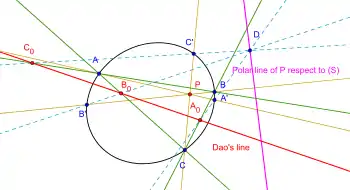
In Euclidean geometry, the Droz-Farny line theorem is a property of two perpendicular lines through the orthocenter of an arbitrary triangle.
Let be a triangle with vertices , , and , and let be its orthocenter (the common point of its three altitude lines. Let and be any two mutually perpendicular lines through . Let , , and be the points where intersects the side lines , , and , respectively. Similarly, let Let , , and be the points where intersects those side lines. The Droz-Farny line theorem says that the midpoints of the three segments , , and are collinear.[1][2][3]
The theorem was stated by Arnold Droz-Farny in 1899,[1] but it is not clear whether he had a proof.[4]
Goormaghtigh's generalization
A generalization of the Droz-Farny line theorem was proved in 1930 by René Goormaghtigh.[5]
As above, let be a triangle with vertices , , and . Let be any point distinct from , , and , and be any line through . Let , , and be points on the side lines , , and , respectively, such that the lines , , and are the images of the lines , , and , respectively, by reflection against the line . Goormaghtigh's theorem then says that the points , , and are collinear.
The Droz-Farny line theorem is a special case of this result, when is the orthocenter of triangle .
Dao's generalization
The theorem was further generalized by Dao Thanh Oai. The generalization as follows:
First generalization: Let ABC be a triangle, P be a point on the plane, let three parallel segments AA', BB', CC' such that its midpoints and P are collinear. Then PA', PB', PC' meet BC, CA, AB respectively at three collinear points.[6]

Second generalization: Let a conic S and a point P on the plane. Construct three lines da, db, dc through P such that they meet the conic at A, A'; B, B' ; C, C' respectively. Let D be a point on the polar of point P with respect to (S) or D lies on the conic (S). Let DA' ∩ BC =A0; DB' ∩ AC = B0; DC' ∩ AB= C0. Then A0, B0, C0 are collinear. [7][8][9]
References
- 1 2 A. Droz-Farny (1899), "Question 14111". The Educational Times, volume 71, pages 89-90
- ↑ Jean-Louis Ayme (2004), "A Purely Synthetic Proof of the Droz-Farny Line Theorem". Forum Geometricorum, volume 14, pages 219–224, ISSN 1534-1178
- ↑ Floor van Lamoen and Eric W. Weisstein (), Droz-Farny Theorem at Mathworld
- ↑ J. J. O'Connor and E. F. Robertson (2006), Arnold Droz-Farny. The MacTutor History of Mathematics archive. Online document, accessed on 2014-10-05.
- ↑ René Goormaghtigh (1930), "Sur une généralisation du théoreme de Noyer, Droz-Farny et Neuberg". Mathesis, volume 44, page 25
- ↑ Son Tran Hoang (2014), "A synthetic proof of Dao's generalization of Goormaghtigh's theorem Archived 2014-10-06 at the Wayback Machine." Global Journal of Advanced Research on Classical and Modern Geometries, volume 3, pages 125–129, ISSN 2284-5569
- ↑ Nguyen Ngoc Giang, A proof of Dao theorem, Global Journal of Advanced Research on Classical and Modern Geometries, Vol.4, (2015), Issue 2, page 102-105 Archived 2014-10-06 at the Wayback Machine, ISSN 2284-5569
- ↑ Geoff Smith (2015). 99.20 A projective Simson line. The Mathematical Gazette, 99, pp 339-341. doi:10.1017/mag.2015.47
- ↑ O.T.Dao 29-July-2013, Two Pascals merge into one, Cut-the-Knot